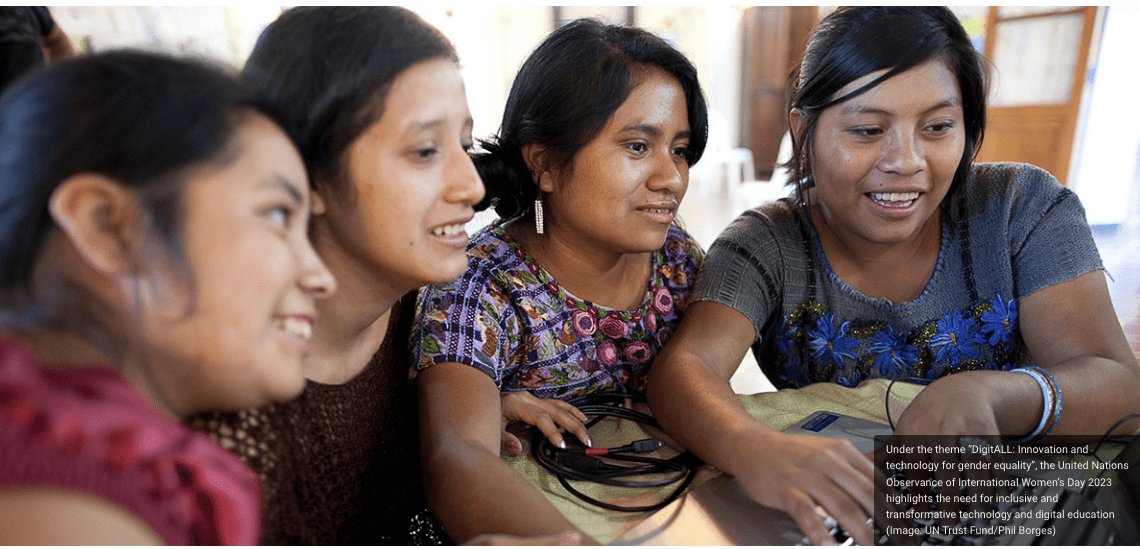By Rebecca Harvey
International Women’s Day – 8 March – is a global celebration of women’s social, economic, cultural, and political achievements. It is also a day to raise awareness about gender inequality.
Despite progress in some areas, women around the world continue to face barriers to full participation in society, with gender-based discrimination and violence persisting in many forms. These challenges are particularly acute for women and girls in low-income countries, indigenous communities and marginalised groups.
Globally, women earn only 77 cents for every US dollar earned by men. Moreover, women comprise only 24% of parliamentarians worldwide and hold only 23% of senior management positions globally. There are also significant issues around digital poverty, with women often disproportionately affected by a lack of access to digital devices, data or skills – essential to participate fully in modern life. This has been recognised by the 2023 UN International Women’s Day (IWD 2023) theme: “DigitALL: Innovation and technology for gender equality”.
Women, particularly those in low-income countries and marginalised communities, often have less access to technology and digital platforms, which limits their ability to generate and utilise data. This can result in data gaps that affect their ability to access services, make informed decisions, and participate in decision-making processes. Women’s lack of representation in data collection and analysis can also result in biases and assumptions that perpetuate gender stereotypes and discrimination.
Last year Kat Dixon, Fellow of the Data Poverty Lab, published a report – Local communities and the internet ecosystem: Scaling solutions to data poverty in the UK – which explored the impact of data poverty on local communities. Dixon recently spoke at the Future Co-ops Conference, where she highlighted the disproportionate impact of data poverty on disadvantaged groups, including women, people with disabilities, and those living in poverty. She argued that “addressing data poverty is essential for promoting social inclusion and tackling inequalities”.
Although Dixon’s report is based on UK research, the conclusions are universal. “Getting everyone the internet access they need has to be a collective effort,” she says. “In tackling data poverty – those being left behind by this system – regulation and subsidy must work collaboratively with industry to harness market forces and find a delicate balance that services all UK citizens. This will help us move into the future and bring everyone with us.”
According to the Digital Cooperation Organization (DCO – a global intergovernmental organisation that aims to enable digital prosperity for all), women are significantly underrepresented in jobs involving science, technology, engineering, and mathematics (STEM). Globally, they hold only two in every 10 STEM jobs and represent just 33% of the workforce at the top 20 largest technology companies. It too sees collaboration and co-operation as key.
“It’s increasingly essential for stakeholders in the digital economy to come together and shape a more inclusive vision for our shared digital economic future,” says Deemah AlYahya, DCO secretary-general.
She describes how there are several co-operation models that governments, organisations, and multilateral organisations can adopt to work together to enable digital prosperity, from co-designing initiatives to accelerate connectivity and increase accessibility and affordability, to working collaboratively to develop innovation-friendly policies and facilitate dialogue to share best practices around digital transformation.
The UN Women’s Gender Snapshot 2022 report showed that women’s exclusion from the digital world has shaved US$1tn from the gross domestic product of low- and middle-income countries in the last decade – a loss that will grow to $1.5tn by 2025 without action. Today, 63% of women have access to the internet, compared to 69% of men. And women are 12% less likely to own a mobile phone.
As part of IWD 2023, the International Cooperative Alliance’s Asia & Pacific regional office (ICA-AP) is hosting a virtual lecture to explore two themes: What do we mean by digital inclusion for women in co-op business? And how do we protect women’s rights and safety in digital spaces?
“Digitalisation and adoption of technology has become integral for any enterprise to grow and can be driven by a lot of factors,” says ICA-AP. “For co-operatives, this can be driven by evolving member needs, increasing competition in the market, changing business goals, and debilitating external shocks such as the Covid-19 pandemic. The pandemic has brought to the fore the significance of digitalisation and the need for digital inclusion for everyone, especially women and marginalised groups.”
The lecture will be given by Anuradha Ganapathy and Malavika Rajkumar, two women associates at IT for Change, an NGO based in Bengaluru, India, which “aims for a society in which digital technologies contribute to human rights, social justice and equity”. They argue that women need to be a fundamental part of the shift towards digitalisation as they form a large part of co-operative businesses. And co-operative businesses themselves are governed by the value of equality and the principle of educating and training everyone involved, so they can develop the co-op and promote the benefits of co-operation (principle 5).
In the Asia and Pacific region, a large number of co-ops are in rural areas where technology and data are not easily accessible, members may be semi-literate and are not trained or comfortable using technology, and women’s access to technology may be mediated by their families. In addition, ICA-AP believes members and management are middle-aged and often reluctant to switch and adapt.
“But bringing women into technology will result in more creative solutions and will also have more potential for innovations promoting gender equality and meeting women’s needs,” says ICA-AP.





















































